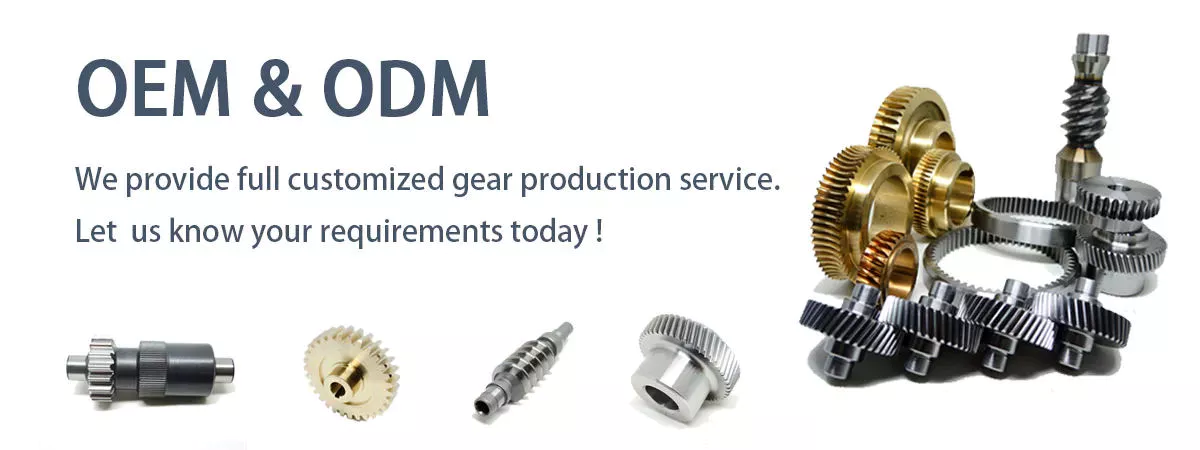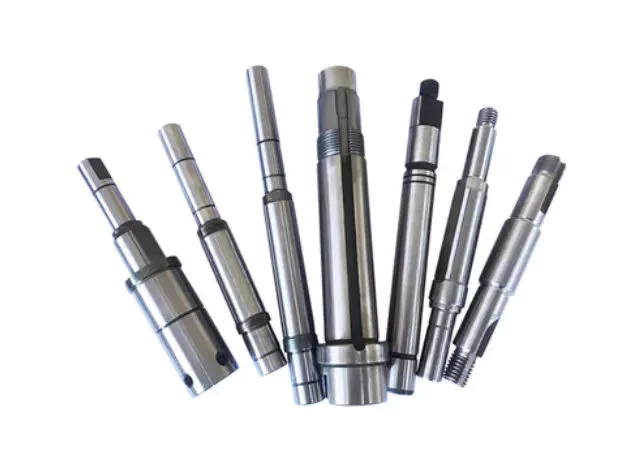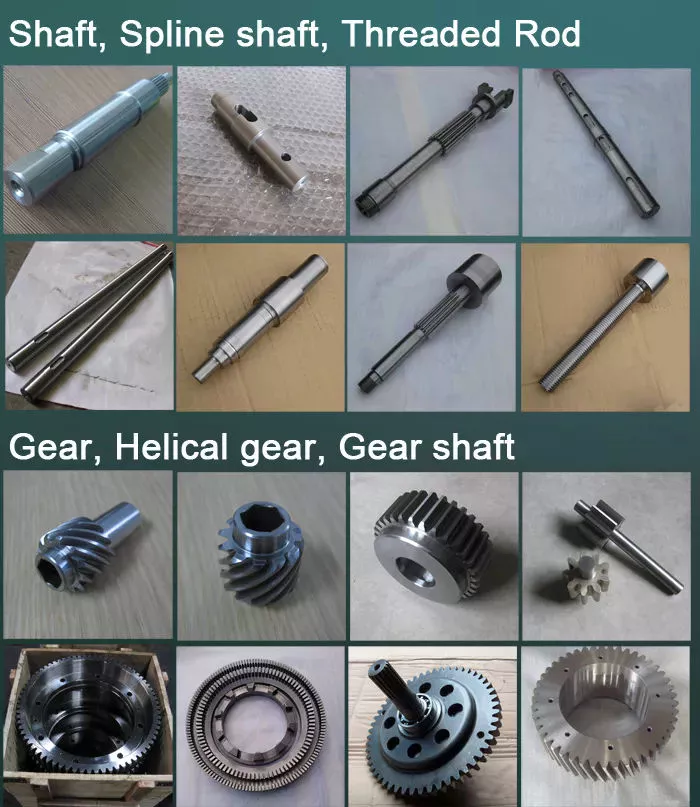Product Description
Domestic C7 rolled ball screw shaft, C5 ground ball screw shaft, Ball screw nut
Company Profile
HangZhou Wangong Precision Machinery Co., Ltd.
About US: Professional producing Ball screw, Linear guide, linear shaft, Linear roller CZPT and linear motion bearings
HangZhou Wangong Precision Machinery Co., Ltd was founded in 2008 and is located in HangZhou City, ZHangZhoug Pro. China. We ahve built a R&D and profuction base of more than 52000m2 , Our expertise lies in manufacturing precision transmission components, As a distinguished high-tech enterprise, we seamlessly integrate research and development, production, sales, and service. We have successfully incorporated advanced equipment and cutting-edge technologies from renowned countries like Germany, Japan and ZheJiang .
Product Description
1,Intruduction
High precision low noise CZPT ball screw
Ball screw is made of screw, nut and ball. The function is to turn the rotary motion into liner motion, which is a further extension and development of ball screw. The significance of this development is to move into a rolling bearing from sliding action; With little friction, ball screws are widely used in various industrial equipment and precision instruments.
2, Ball screw feature
High Reliability
TBI MOTION or CZPT ball screw has very stringent quality control standards covering every production process. With proper lubrication and use,trouble-free operation for an extended period of time is possible.
Smooth Operation
The high efficiency of ball screws is vastly superior to conventional screws. The torque required is less than 30%. Linear motion can be easily changed from rotary motion.
High Rigidity and Preload
When axial play is minimized in conventional screw-nut assemblies, the actuating torque becomes excessive and the operation is not smooth. The axial play in TBI MOTION or CZPT precision ball screws may be reduced to zero by preloading and a light smooth operation is still possible. herefore, both low torque and high rigidity can be obtained simultaneously.TBI MOTION or CZPT ball screws have gothic CZPT groove profiles which allow these conditions to be achieved.
Circulation Method
Ball return tube method.(V,E,S,Y type);Ball defelector method.(I,U,M,K type)
High Durability
Rigidly selected materials, intensive heat treating and processing techniques, backed by years of experience,have resulted in the most durable ball screws manufactured.
3, All kinds of ball srew series
There are many different series of ball screw shaft with nut, like SFU series, SFS series, SFI series, SFY series, DFU series, SFUL series, SFK series.Each series has its own characteristics, Let’s look at the difference in appearance and characteristics.
| SFU series | SFS/SFA series | SFI series |
| DFU series | SFY series | SFK series |
| SCI series | Ball screw set | C5 ground ball screw series |
4, Ball screw Specification
1. Cold rolled ball screw;
2. Gcr15 material;
3. High-speed operation
4. C5 C7 C10 precision;
5. No gap and preloading
6. Quality as good as TBI brand is high precision, long life use.
7. Pay more attention to before-sale, in-sale, after -sales service.
8. Manufacturer with large stock & short delivery
| Ball Screw Features |
|||||
| Item | Material | Heat Treatment |
Hardness | Accurancy | Preload |
| Ball screw shaft | SCM450 S55C CF53 |
Induction Heating |
HRC58-62 | C5:0.018mm C7:0.05mm C10:0.21mm |
P1:Zero P2:Light P3:Medium P4:Heavy |
| Ball screw nut | SCM415 20CrMo |
Carbonizing Hardening |
HRC58-62 | C5:0.018mm | P1:Zero P2:Light P3:Medium P4:Heavy |
| Steel balls | SUJ2 GCr15 |
HRC58-62 | |||
| Brand name | ERSK, (they are CZPT to interchange into ZheJiang TBI ball screw and nut) |
| Product name | C5 ground ball screw, C7 rolled ball screw |
| Model no. | SFU/SFNU/SFS/SFA/SFI/SFY/DFU/SFK/SCI series |
| Material | S55C material for ball screw shaft, 20CrMo material for ball screw nut |
| Service | after-sale service and technical assistance as per customer’s requirement and needs. Customers are always given quickly support. |
| Length | Max:6000mm, other length as your requirement |
| Delivery time | Base on customer required quantity,by negotiated |
| Products packing | Plastic bag+box case or wooden case, or according to customer’s requestment |
| Sample | Sample order could be available |
| Payment terms | T/t or L/C are available for large orders, Paypal and West Union for small orders |
| Shipping method | DHL,UPS,TNT,FEDEX,EMS,Airfreight and by sea, By negotiated |
| Quality | ISO9001-2008 |
5, We can machinize the ball screw shaft according to the drawings
6, Data sheet
Installation Instructions
The way to assemble the ball screw nut in the ball screw shaft
Related products
ERSK manufacturer main products
Our Advantages
As a distinguished high-tech enterprise, we seamlessly integrate research and development, production, sales, and service. We have successfully incorporated advanced equipment and cutting-edge technologies from renowned countries like Germany, Japan, and ZheJiang . Our commitment to innovation has led to the acquisition of multiple product design patents, and we proudly adhere to ISO9001 certification standards.
Our service
Our Team:
Professional technicians, high-quality production workers, 24-hour salespersons
OUR PHILOSOPHY:
Integrity is at the core of our values, and providing excellent
service is our top priority. We begin by understanding your
needs and strive to ensure your utmost satisfaction, forging a mutually beneficial relationship.
OUR MISSION:
Through technology and innovation, we strive to enhance
product quality and deliver exceptional products and services
to you.
OUR VISION:
We are firmly dedicated to CZPT the CZPT of highquality standards and venturing into the realm of world-class
advanced manufacturing industries.
We are excited about the opportunity to work with you and
exceed your expectations.
| Precision: | C5 |
|---|---|
| Screw Diameter: | 11-20mm |
| Flange: | With Flange |
| Samples: |
US$ 100/Piece
1 Piece(Min.Order) | Order Sample SFA1205
|
|---|
| Customization: |
Available
| Customized Request |
|---|
.shipping-cost-tm .tm-status-off{background: none;padding:0;color: #1470cc}
|
Shipping Cost:
Estimated freight per unit. |
about shipping cost and estimated delivery time. |
|---|
| Payment Method: |
|
|---|---|
|
Initial Payment Full Payment |
| Currency: | US$ |
|---|
| Return&refunds: | You can apply for a refund up to 30 days after receipt of the products. |
|---|

Screw Shaft Types
A screw shaft is a cylindrical part that turns. Depending on its size, it is able to drive many different types of devices. The following information outlines the different types of screws, including their sizes, material, function, and applications. To help you select the right screw shaft, consider the following factors:
Size
A screw can come in a variety of shapes and sizes, ranging from a quarter to a quarter-inch in diameter. A screw is a cylindrical shaft with an inclined plane wrapped around it, and its main function is to fasten objects together by translating torque into a linear force. This article will discuss the dimensions of screws and how to determine the size of a screw. It is important to note that screw sizes can be large and small depending on the purpose.
The diameter of a screw is the diameter of its shaft, and it must match the inner diameter of its nuts and washers. Screws of a certain diameter are also called machine screws, and they can be larger or smaller. Screw diameters are measured on the shaft underneath the screw head. The American Society of Mechanical Engineers (ASME) standardized screw diameters in 3/50-inch to 16 (3/8-inch) inches, and more recently, sizes were added in U.S. fractions of an inch. While shaft and head diameters are standardized, screw length may vary from job to job.
In the case of the 2.3-mm screw group, the construct strength was not improved by the 1.2-mm group. The smaller screw size did not increase the strength of the construct. Further, ABS material did not improve the construct strength. Thus, the size of screw shaft is an important consideration in model design. And remember that the more complex your model is, the larger it will be. A screw of a given size will have a similar failure rate as a screw of a different diameter.
Although different screw sizes are widely used, the differences in screw size were not statistically significant. Although there are some limitations, screws of different sizes are generally sufficient for fixation of a metacarpal shaft fracture. However, further clinical studies are needed to compare screw sizes for fracture union rates. So, if you are unsure of what size of screw shaft you need for your case, make sure to check the metric chart and ensure you use the right one.
Material
The material of a screw shaft plays an important role in the overall performance of a screw. Axial and central forces act to apply torque to the screw, while external forces, such as friction, exert a bending moment. The torsional moments are reflected in the torque, and this causes the screw to rotate at a higher rate than necessary. To ensure the longevity of the screw, the material of the screw shaft should be able to handle the bending moment, while the diameter of the shaft should be small enough to avoid causing damage.
Screws are made from different metals, such as steel, brass, titanium, and bronze. Manufacturers often apply a top coating of chromium, brass, or zinc to improve corrosion resistance. Screws made of aluminum are not durable and are prone to rusting due to exposure to weather conditions. The majority of screw shafts are self-locking. They are suited for many applications, including threaded fasteners, C-clamps, and vises.
Screws that are fabricated with conical sections typically feature reduced open cross-sectional areas at the discharge point. This is a key design parameter of conical screw shafts. In fact, reductions of up to 72% are common across a variety of applications. If the screw is designed to have a hard-iron hanger bearing, it must be hardened. If the screw shaft is not hardened, it will require an additional lubricant.
Another consideration is the threads. Screw shafts are typically made of high-precision threads and ridges. These are manufactured on lathes and CNC machines. Different shapes require different materials. Materials for the screw shaft vary. There are many different sizes and shapes available, and each one has its own application. In addition to helical and conical screw shafts, different materials are also available. When choosing material, the best one depends on the application.
The life of the screw depends on its size, load, and design. In general, the material of the screw shaft, nut body, and balls and rollers determine its fatigue life. This affects the overall life of the screw. To determine whether a specific screw has a longer or shorter life, the manufacturer must consider these factors, as well as the application requirements. The material should be clean and free of imperfections. It should be smooth and free of cracks or flaking, which may result in premature failure.
Function
The function of a screw shaft is to facilitate the rotation of a screw. Screws have several thread forms, including single-start, double-start and multi-start. Each form has its own advantages and disadvantages. In this article we’ll explore each of them in detail. The function of a screw shaft can vary based on its design, but the following are common types. Here are some examples of screw shaft types and their purposes.
The screw’s torque enables it to lift objects. It can be used in conjunction with a bolt and nut to lift a load. Screws are also used to secure objects together. You can use them in screw presses, vises, and screw jacks. But their primary function is to hold objects together. Listed below are some of their main functions. When used to lift heavy loads, they can provide the required force to secure an object.
Screws can be classified into two types: square and round. Square threads are more efficient than round ones because they apply 0deg of angle to the nut. Square threads are also stronger than round threads and are often used in high-load applications. They’re generally cheaper to manufacture and are more difficult to break. And unlike square threads, which have a 0deg thread angle, these threads can’t be broken easily with a screwdriver.
A screw’s head is made of a series of spiral-like structures that extend from a cylindrical part to a tip. This portion of the screw is called the shank and is made of the smallest area. The shank is the portion that applies more force to the object. As the shaft extends from the head, it becomes thinner and narrow, forming a pointed tip. The head is the most important part of the screw, so it needs to be strong to perform its function.
The diameter of the screw shaft is measured in millimeters. The M8 screw has a thread pitch of 1.25 mm. Generally, the size of the screw shaft is indicated by the major and minor diameter. These dimensions are appended with a multiplication sign (M8x1).
Applications
The design of screws, including their size and shape, determines their critical rotating speeds. These speeds depend on the threaded part of the screw, the helix angle, and the geometry of the contact surfaces. When applied to a screw, these limits are referred to as “permissible speed limits.” These maximum speeds are meant for short periods of time and optimized running conditions. Continuous operation at these speeds can reduce the calculated life of a nut mechanism.
The main materials used to manufacture screws and screw shafts include steel, stainless steel, titanium, bronze, and brass. Screws may be coated for corrosion resistance, or they may be made of aluminium. Some materials can be threaded, including Teflon and nylon. Screw threads can even be molded into glass or porcelain. For the most part, steel and stainless steel are the most common materials for screw shafts. Depending on the purpose, a screw will be made of a material that is suitable for the application.
In addition to being used in fasteners, screw shafts are used in micrometers, drillers, conveyor belts, and helicopter blades. There are numerous applications of screw shafts, from weighing scales to measuring lengths. If you’re in the market for a screw, make sure to check out these applications. You’ll be happy you did! They can help you get the job done faster. So, don’t delay your next project.
If you’re interested in learning about screw sizing, then it’s important to know the axial and moment loads that your screws will experience. By following the laws of mechanics and knowing the load you can calculate the nominal life of your screw. You can also consider the effect of misalignment, uneven loading, and shocks on your screw. These will all affect the life of your screw. Then, you can select the right screw.


editor by CX 2023-11-21